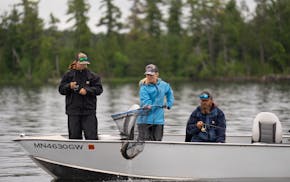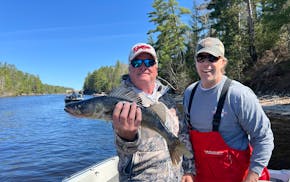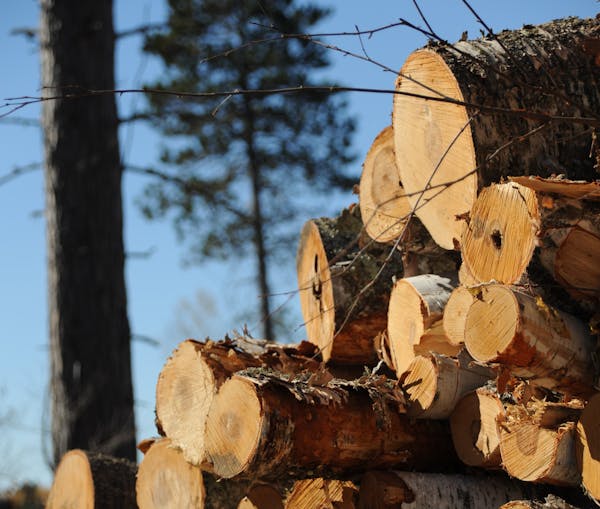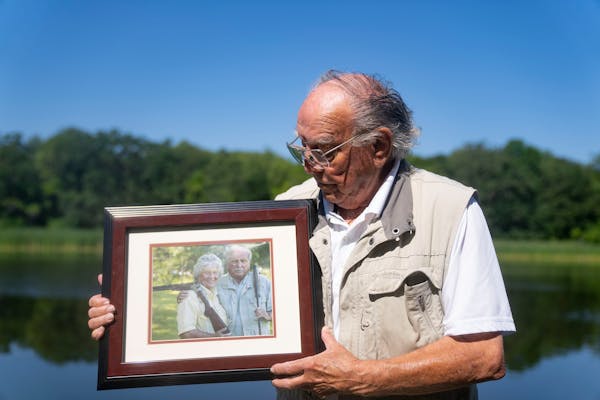Sometimes events occur in a sequence that, considered together, divulges greater truths. Or, if not truths, revelations.
That's what happened to me last week when I read in this newspaper the latest story by my colleague Tony Kennedy about logging authorized by the Department of Natural Resources (DNR) on state wildlife management areas (WMAs) and aquatic management areas (AMAs).
Kennedy reported the U.S. Fish and Wildlife Service (FWS) dropped the hammer on the DNR for allowing logging contracts on WMAs and AMAs without previous federal authorization to ensure the cuttings were done primarily to help wildlife, which is the required purpose.
Logging on those lands has been in dispute since DNR field staff wrote to Commissioner Sarah Strommen four years ago saying it was "scientifically dishonest" to claim, as DNR administrators were, that logging on the two areas was occurring primarily to benefit wildlife.
Kennedy's story quoted Strommen saying: "We manage for wildlife purposes."
Huh, I thought, upon reading that. Not quite sure if that's accurate.
That same day, in the second of two events I tied together — connecting the dots, as it were, if only in my mind — I heard that Robbie Robertson, the great songwriter and lead guitarist of the Band, had died.
Robertson, as anyone who has followed his music knows, didn't have a dishonest bone in his body. What he believed and sensed he channeled directly through his Fender Stratocaster and made music.
"I really have to feel," Robertson once said, "a sense of freedom in my storytelling."
Huh, I thought. That sounds about right.
The letter written to Strommen by 28 DNR field managers four years ago didn't convince the commissioner to stop logging on state fish and wildlife management areas.
In fact, Strommen's reply essentially told her subordinates that there was nothing here to see and that they should move on.
Nor did Strommen yield to a group of retired DNR wildlife and forestry managers who repeatedly complained she was turning the principle of wildlife management on its head by giving DNR foresters, rather than wildlife managers, greater say over the types of trees — and sizes of cuttings — to be felled.
Martha Minchak, a retired DNR wildlife manager, told the Star Tribune last year: "Forestry holds sway over everything else right now. Wildlife management is being sacrificed for timber harvest."
Gretchen Mehmel, another retired DNR wildlife manager, agreed. "It's a battle right now over trees on WMAs," she said.
The scrum over WMA and AMA trees arose after a 2018 pact known as the Sustainable Timber Harvest Initiative was signed by various Minnesota stakeholders. The agreement, which increased stumpage on state lands available to loggers, was produced at the request of the timber industry, which supports some 63,000 jobs in Minnesota and is well-connected politically.
A commonly held belief among some observers, in fact, is that in the WMA and AMA logging conflict, Strommen is doing the bidding of her boss, Gov. Tim Walz, who in turn is kowtowing to timber producers.
"This issue has been in the news for four years — four years!" said former DNR deputy commissioner and attorney Steve Thorne in an email to the Star Tribune. "Yet [Walz] has done nothing to prevent the DNR commissioner from violating the law and endangering millions of dollars of critical funding. Whether he has been hoodwinked by his commissioner or knowingly approved her actions, allowing this disaster to unfold is simply bad management."
This "disaster," as Thorne describes it, ended last week when Strommen finally yielded to what the great Vikings wide receiver Randy Moss once described as "straight cash, homie."
Twenty-two million dollars, to be exact.
That's how much the FWS will withhold in federal funds until the DNR produces documentation that logging it has authorized complies with federal rules, and that future logging will, too.
At issue is the purchase, in part, of the fish and wildlife areas with funds contributed by hunters and anglers through the Pittman-Robertson Act of 1937 and the Dingell-Johnson Act of 1950.
Both federal laws tax fishing and hunting equipment, and the funds are apportioned to states for habitat restoration and related programs. The states must agree not to divert the money from its intended purpose, which generally is to benefit fish and wildlife — not loggers.
Chuck Traxler, FWS Midwest acting regional director, told Strommen in a letter last week, "The DNR has acknowledged that it sold logging permits without providing the necessary advance documentation of the habitat purpose of these sales."
Such documentation is necessary, Traxler wrote, to ensure the logging complies with three federal laws "and other grant requirements."
Strommen, in response, told Kennedy she has "zero concerns" the DNR can provide the required paperwork.
Which will be interesting because it's unlikely the same field staff who have criticized WMA and AMA logging for four years will now produce, willy-nilly, the homework Strommen needs to free up the $22 million.
Which brings me back to Strommen and Robbie Robertson.
As a gifted and successful artist, Robertson lived free of many of the occupational encumbrances and compromises that burden the rest of us. For a rock star, or something on that order, he didn't even like to tour, and didn't much.
Strommen, meanwhile, is more like you and me, torn professionally in a lot of directions.
But too often, it could be argued, she bends to the loudest voices in the room while forgetting those that suffer, silently, our communal slights — the nuthatches and bluejays, woodpeckers and squirrels, ruffed grouse and wood ducks, for example, that depend on the WMA and AMA trees that have fallen to loggers' axes.
Logging isn't bad, and no one is saying it shouldn't occur on these lands. But in these instances, fish and wildlife should be considered first — not only because it's required but because it's the right thing to do.
The irony is that if Minnesota DNR commissioners more often stood up to loggers who want to target wildlife lands, farmers who want to drain wetlands, developers who want to build and pave, and the politicians who do their bidding, as well as other resource exploiters, the commissioners' popularity among the rank and file would increase. And they would be more likely, not less, to keep their jobs.
As it is now, if they don't jump high enough, when told, they could be out the door tomorrow.
And Strommen's been jumping.
Robertson, in his own way, once spoke to the importance of doing the right thing for its own sake, and enjoying the reward, if only personally, of making the effort.
"Some bands today," he once said, "have the experience of really working together and honing their craft. And other bands are very much like, 'I just got a guitar for Christmas, let's start a band.'
"And you can hear the difference."

Anderson: In early June, Minnesota fish are begging to be caught. Won't you help?

Anderson: Tails wagging, DNR officers' dogs find lost people and missing evidence
Anderson: Punish poachers more
Anderson: The Chainsaw Sisters Saloon is gone, but the Echo Trail is still a pathway to possibilities



